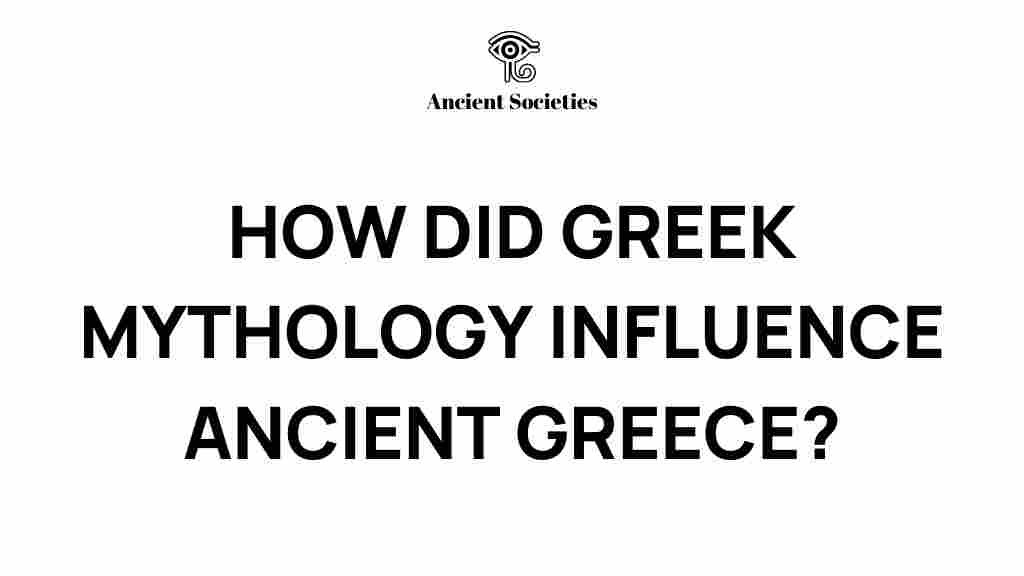Unraveling the Impact of Greek Mythology on Ancient Greek Society
Greek mythology is a fascinating tapestry that weaves together the beliefs, stories, and cultural practices of Ancient Greece. It reflects the society’s values, norms, and philosophical inquiries, influencing various aspects of life, including religion, art, and storytelling. Understanding how Greek mythology shaped Ancient Greece helps us appreciate its cultural influence on the Western world.
The Role of Mythology in Ancient Greek Religion
Religion in Ancient Greece was deeply intertwined with mythology. The myths served as narratives that explained the nature of the divine and the world around them. Major elements include:
- Gods and Goddesses: The pantheon of deities, such as Zeus, Hera, and Athena, played significant roles in both personal and civic life.
- Rituals and Worship: Myths dictated how people worshipped, including festivals and sacrifices, to appease the gods and secure their favor.
- Moral Lessons: Many myths conveyed moral lessons, guiding societal behavior and expectations.
The narratives surrounding these deities were not mere stories; they were integral to the identity and spirituality of Ancient Greece. The myths provided a framework for understanding existence, morality, and human nature.
Cultural Influence of Greek Mythology on Society
Greek mythology significantly influenced various facets of Ancient Greek society:
- Ethics and Morality: Myths often illustrated ethical dilemmas faced by heroes, establishing moral standards.
- Political Structure: The belief in divine right and favor played a crucial role in legitimizing rulers and political systems.
- Social Cohesion: Shared myths fostered a sense of community and identity among the Greeks, uniting them under common beliefs.
Through these elements, Greek mythology acted as a binding force, creating a cohesive social fabric that influenced everything from politics to personal relationships.
Greek Mythology and Storytelling Tradition
Storytelling was a vital aspect of Ancient Greek culture, with mythology at its core. The myths were transmitted orally before being recorded by poets like Homer and Hesiod. This tradition included:
- Epic Poetry: Works such as the “Iliad” and the “Odyssey” showcased the heroic ideals and struggles of gods and mortals.
- Tragedy and Comedy: Greek theater used mythological themes to explore human emotions, societal issues, and philosophical questions.
- Fables and Folklore: Myths often featured animals and gods, imparting wisdom and life lessons to audiences.
These storytelling forms were not only entertainment; they were educational, philosophical, and reflective of the culture’s values, beliefs, and historical context.
The Artistic Expression of Mythology
Art in Ancient Greece was heavily influenced by mythology, evident in various forms:
- Visual Arts: Pottery, sculptures, and frescoes often depicted mythological scenes, showcasing gods, heroes, and mythical creatures.
- Architecture: Temples dedicated to gods, such as the Parthenon, were designed to honor mythological narratives and divine presence.
- Performing Arts: Theatrical performances brought myths to life, allowing the audience to engage with the stories on a deeper emotional level.
The artistic representations of mythology not only reflected the stories but also served to reinforce cultural values and communal identity.
Philosophy and Mythology: A Complex Relationship
Philosophers in Ancient Greece often grappled with the implications of mythology. Their relationship can be summarized as follows:
- Critique of Myths: Philosophers like Plato questioned the morality of certain myths, advocating for a rational approach to understanding the world.
- Symbolism: Myths were often interpreted symbolically, revealing deeper truths about human existence and the nature of reality.
- Integration: Some philosophers integrated mythological concepts into their work, using them to illustrate complex ideas.
This interplay between mythology and philosophy enriched the intellectual landscape of Ancient Greece, prompting critical thinking about existence and morality.
Impact on Modern Society
The influence of Greek mythology extends far beyond Ancient Greece. Today, its legacy can be seen in:
- Literature: Many modern writers draw inspiration from Greek myths, incorporating archetypes and themes into their narratives.
- Art and Film: Contemporary art and cinema frequently reference mythological figures and stories, ensuring their relevance in popular culture.
- Psychology: Concepts derived from myths, such as the hero’s journey, inform psychological theories and therapeutic practices.
Greek mythology continues to resonate, showcasing its enduring relevance and cultural influence throughout history.
Troubleshooting Common Misconceptions About Greek Mythology
As with any rich cultural tradition, there are common misconceptions about Greek mythology. Here are some troubleshooting tips to clarify these misunderstandings:
- Myth vs. History: Many people confuse myths with historical facts. Remember, myths are symbolic narratives that convey moral and cultural truths rather than literal historical accounts.
- Monotheism vs. Polytheism: Some misunderstand Greek mythology as being monotheistic. In reality, it is polytheistic, featuring a pantheon of gods and goddesses with distinct personalities and domains.
- Universal Morality: Myths often reflect the specific cultural values of Ancient Greece and may not align with contemporary moral standards.
By addressing these misconceptions, one can appreciate the depth and complexity of Greek mythology and its role in shaping Ancient Greek society.
Conclusion
Greek mythology plays a pivotal role in understanding the cultural influence of Ancient Greece. Its impact on religion, storytelling, art, and philosophy is profound and multifaceted. The myths served as a means of explaining the world, guiding moral conduct, and fostering community identity.
As we delve into the stories of gods, heroes, and mythical creatures, we uncover not only the history and beliefs of Ancient Greece but also the timeless lessons and themes that continue to resonate today. To explore further, consider visiting this resource on Greek mythology.
In the end, the rich tapestry of Greek mythology remains an essential aspect of our cultural heritage, inviting us to reflect on our own beliefs and values in an ever-evolving society.
This article is in the category Culture and created by AncientSocieties Team
